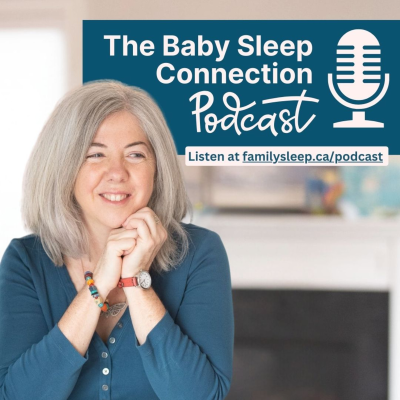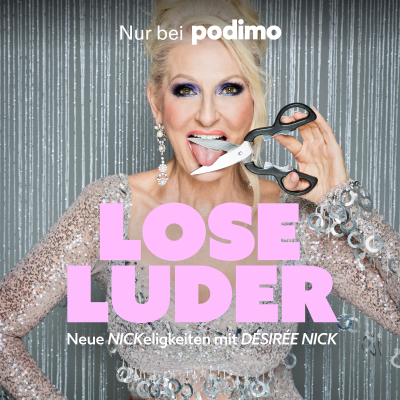
The Baby Sleep Connection: Holistic help for tired, responsive parents who don't want to sleep train
Englisch
Kostenlos bei Podimo
Kostenlos hören bei Podimo
Starte jetzt und verbinde dich mit deinen Lieblingspodcaster*innen
- Vertraut von über 1 Mio. deutschen Hörer*innen
- Über 1.000 lokale Podcasts und Shows – nur bei Podimo
- Keine Zahlung nötig
Mehr The Baby Sleep Connection: Holistic help for tired, responsive parents who don't want to sleep train
Hello tired parents! If you feel exhausted and overwhelmed about your baby’s sleep and are trying to be gentle and responsive but aren’t clear how, welcome! In this podcast, we go beyond wake windows and bedtimes to help you understand your baby’s sleep so that you can find responsive ways to support it…without sleep training! The Baby Sleep Connection also explores all the layers connected to baby sleep --maternal mental health, nutrition, temperament, sensory processing, gentle/responsive parenting, and infant development so that sleep (and life!) feels easier. I'm so glad you're here.
Alle Folgen
69 FolgenEp 68: Is Calmness Overrated?
If you’ve been giving yourself a hard time for not staying calm, have a listen. Perhaps being calm is overrated. It feels so good to stay calm, but calmness doesn’t always fit the situation. It’s also simply part of the human experience to go through challenges that throw us out of calm, dysregulate us, and leave us feeling off balance and stressed. The Beatles may have sung about having “nothing to get hung about”, but the truth is there are things in life to get hung about. I am proud to say that my teenager edited and published this episode for me. But in our excitement of working together (and my impatience to get it published after a 3 week delay) I, the mom, missed a couple of portions that I'd have typically edited out. But I'm leaving it up --because one of my mantras is "done is better than perfect". So enjoy this less polished version that gives a little insight into what goes into pushing an episode out in the world. In this episode, Heather talks about: * Is staying calm really the goal? * When things get hectic, stressful, or exciting, do we “stay” regulated? Or do we match ourselves to the situation? * A 4-stage framework that is an alternative to “staying calm”: Recognize, Recalibrate, Reset, and Nurture * The analogy of squeezing a lemon * An incident this morning that gave Heather real world practice recognizing, recalibrating, and resetting. Mentioned in this podcast: * Lisa Carpenter, coach and previous guest on The baby Sleep Connection Podcast: lisacarpenter.ca [http://lisacarpenter.ca] * Mitch Albom, Twice, novel. What you can do next: * Provide a review on Apple Podcasts. It truly makes a difference to reaching families who would benefit from understanding their baby’s sleep better. * Sign up for weekly baby sleep emails. [https://heatherboyd.activehosted.com/f/1] https://heatherboyd.activehosted.com/f/1 [https://heatherboyd.activehosted.com/f/1] * Book a screening call with Heather [https://familysleep.ca/] (receipts provided for families in many provinces in Canada -email Heather at heather@heatherboyd.ca if you wonder if your province is covered) Credits: 🎵 Music: Jordan Wood
Ep 67: Parenting with Triplets, Adoption, and Disability
To start 2026, I’m joined by a guest whose story brings new perspectives around surviving and thriving in parenthood. Stephanie Woodward is a not-for-profit CEO, attorney, proud disabled woman, and mom to six children—including triplets and children adopted through foster care. She and her husband went from family of 2 to family of 8 within a single year. In this conversation, we explore parenting multiples, navigating NICU life, pregnancy loss, supporting older siblings through massive transitions, and why routine plus flexibility matters more than having a perfect plan. Stephanie also speaks candidly about disability, scrutiny, and the assumptions that still shape how society views parents, and disabled parents in particular —often without realizing it. This episode isn’t about one right way of parenting: It’s about responsiveness, creativity, advocacy, and building family life around what actually works. In this episode, we cover: * Parenting triplets alongside older children * Life in the NICU and transitioning home * Supporting big siblings through major family changes * Parenting as a wheelchair user and adapting routines * Misconceptions about disability and caregiving * Why “routine plus flexibility” is a powerful parenting framework You can find Stephanie and her family on Instagram at @WCTriplets, and learn more about her work with the Disability EmpowHER Network via the links below. Where you can find Stephanie: * Instagram, TicTok, and Facebook at WC Family @WCTriplets * Disability EmpowHER Network https://www.disabilityempowhernetwork.org/ What you can do next * Book a screening call with Heather [https://familysleep.ca/] (receipts provided for Ontario families) * Subscribe to this podcast and share it with a friend! Provide a review on Apple Podcasts. It truly makes a difference to reaching families who would benefit from understanding their baby’s sleep better. * Sign up for weekly baby sleep emails. [https://heatherboyd.activehosted.com/f/1] * Book a screening call with Heather [https://familysleep.ca/] (receipts provided for Ontario families) Credits: 🎵 Music: Jordan Wood
Ep 66: Obstructive Sleep Apnea and Sleep
Sometimes health and medical issues get in the way of how sleep development unfolds. In this episode, Heather Boyd discusses why airway and obstructive sleep apnea are so important to understand, common signs parents may see at night and during the day, sleep apnea’s impact on learning and behaviour, and a plan of action if you are noticing signs of obstructive sleep apnea in your infant. Knowing what to look for and when to pursue medical support can make all the difference. Mentioned in this episode: * Little Bird Dental self-assessment tool: https://littlebirddental.ca/airway-centric-health-care/ What you can do next: * Subscribe to this podcast and share it with a friend! * Download the Parent Self-Care Toolkit at https://heatherboyd.vipmembervault.com/products/units/view/1239883/?lesson=1601156 * Find previous episodes of the podcast at familysleep.ca/podcast [http://familysleep.ca/podcast] Credits: 🎵 Music: Jordan Wood
Ep 65: 5 New Year Questions to Ask Yourself Instead of Making Resolutions
New Years Eve, and New Years Resolutions land differently once you’re a parent. The idea of setting resolutions and goals for oneself in the usual ways may not fit at your season of parenting. And that’s ok. Instead, let’s explore 5 questions to ask yourself as you step into 2026. Join Heather Boyd, Occupational Therapist, sleep coach, and mother of 3 as she explores the merit of asking yourself: 1. What about this past year am I proud of or feel happy when I think of it? 2. What do I want to take with me from this past year? 3. Who do I want to be this coming year? 4. What do I want from my environment that will help me thrive and feel good --and how will I create it? 5. Who in my life is important to me (and have I told them lately)? Here’s to the coming months/season/stage of your parenting providing you with rest, connection, and meaning. What you can do next: * Subscribe to this podcast and share it with a friend! Provide a review on Apple Podcasts. It truly makes a difference to reaching families who would benefit from understanding their baby’s sleep better. * Sign up for weekly baby sleep emails. [https://heatherboyd.activehosted.com/f/1] * Book a screening call with Heather [https://familysleep.ca/] (receipts provided for Ontario families) Credits: 🎵 Music: Jordan Wood
Ep 64: The First Few Days of Newborn Sleep
In this episode, we break down what newborn sleep really looks like in the first week—especially the shift from the sleepy first night to the cluster-feeding intensity of night two. You’ll learn what’s normal, why it happens, and simple ways to support rest and regulation in these early days. Night one is recovery; night two is recalibration. We cover: * The biology of newborn sleep and why it’s so fragmented * What to expect on Night 1 * What to expect on Night 2 (and why it feels so intense) * Gentle strategies that actually help in week one * Red flags that mean it’s time to reach out for support Mentioned in this episode: * Ep 62: Sleep Development from Newborn to 3 months [https://open.spotify.com/episode/0n8JNtQkEYUG6elxcgj09C?si=fkCPLU11RxGN8RRyZFPRzQ] * Join the December 16th Mom & Baby Circle sample class at Between Mothers in St. Catharines [www.familysleep.ca/mom-and-baby-group] * Ep 15: Holistic Approaches to Raising Healthy Kids with integrative pediatrician, Dr. Joel Warsh [https://open.spotify.com/episode/7gS5L44VWiS5F4qFWb5BS7?si=LDkXwZOJR_SbZ-sv35tsMw] * Ep 25: The Feeding Journey with Karla Masse, IBCLC What you can do next * Subscribe to this podcast and share it with a friend! Provide a review on Apple Podcasts. It truly makes a difference to reaching families who would benefit from understanding their baby’s sleep better. * Sign up for weekly baby sleep emails. https://heatherboyd.activehosted.com/f/1 * Book a screening call with Heather (receipts provided for Ontario families) Credits: 🎵 Music: Jordan Wood















































